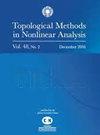Liouville type theorems for Kirchhoff sub-elliptic equations involving $\Delta_\lambda$-operators
IF 0.7
4区 数学
Q2 MATHEMATICS
引用次数: 0
Abstract
In this paper, we study the Kirchhoff elliptic equations of the form $$ -M(\|\nabla_\lambda u\|^2)\Delta_\lambda u=w(x)f(u) \quad \mbox{in }\mathbb R^{N}, $$ where $M$ is a smooth monotone function, $w$ is a weight function and $f(u)$ is of the form $u^p, e^u$ or $-u^{-p}$. The operator $\Delta_\lambda$ is strongly degenerate and given by $$ \Delta_\lambda=\sum_{j=1}^N \frac{\partial}{\partial x_j}\bigg(\lambda_j^2(x)\frac{\partial }{\partial x_j}\bigg). $$ We shall prove some classifications of stable solutions to the equation above under general assumptions on $M$ and $\lambda_j$, $j=1,\ldots,N$.涉及$\Delta_\lambda$ -算子的Kirchhoff次椭圆方程的Liouville型定理
本文研究了形式为$$ -M(\|\nabla_\lambda u\|^2)\Delta_\lambda u=w(x)f(u) \quad \mbox{in }\mathbb R^{N}, $$的Kirchhoff椭圆方程,其中$M$为光滑单调函数,$w$为权函数,$f(u)$为$u^p, e^u$或$-u^{-p}$的形式。算子$\Delta_\lambda$是强退化的,由$$ \Delta_\lambda=\sum_{j=1}^N \frac{\partial}{\partial x_j}\bigg(\lambda_j^2(x)\frac{\partial }{\partial x_j}\bigg). $$给出。我们将在$M$和$\lambda_j$, $j=1,\ldots,N$上证明上述方程在一般假设下的稳定解的一些分类。
本文章由计算机程序翻译,如有差异,请以英文原文为准。
求助全文
约1分钟内获得全文
求助全文
来源期刊
CiteScore
1.00
自引率
0.00%
发文量
57
审稿时长
>12 weeks
期刊介绍:
Topological Methods in Nonlinear Analysis (TMNA) publishes research and survey papers on a wide range of nonlinear analysis, giving preference to those that employ topological methods. Papers in topology that are of interest in the treatment of nonlinear problems may also be included.

 求助内容:
求助内容: 应助结果提醒方式:
应助结果提醒方式:


